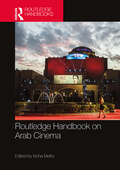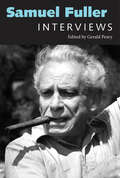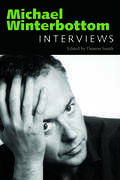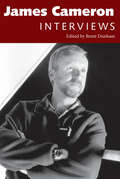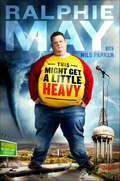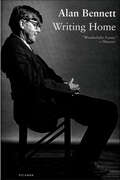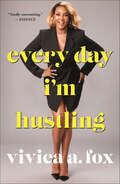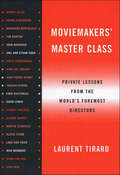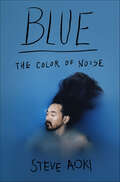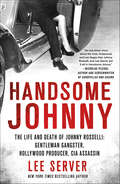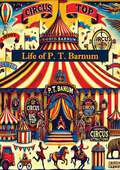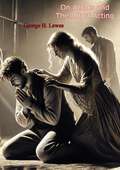- Table View
- List View
Routledge Handbook on Arab Cinema
by Noha MellorBuilding on a growing body of literature, this Handbook provides an up-to-date and authoritative survey of Arab cinema.The collection includes contributions from academics and filmmakers from across the Arab region, Europe, and North America, and fills a gap in media studies by examining the entire Arab region, rather than focusing on one country or theme. The Handbook also sheds light on the heterogeneity of Arab filmmaking not only within the Arab region, but also globally, within diasporic communities. It is split into six parts: Part 1 provides an overview of each sub-region in the Arab world, including a chapter on Arab animation films. Parts 2, 3, and 4 address topical themes, encompassing the representation of gender, religion, and identity politics in Arab cinema. Part 5 discusses the theme of diaspora and Part 6 concludes the volume with reflective essays penned by selected diasporic filmmakers. This book is an essential reference for Arab media and cinema scholars, students, and professional filmmakers. With case studies from across the Arab region, it's also a valuable resource for anyone interested in film and media, global cinema, and the Middle East generally.
Samuel Fuller: Interviews (Conversations with Filmmakers Series)
by Gerald PearyIn the early twentieth century, the art world was captivated by the imaginative, original paintings of Henri Rousseau, who, without formal art training, produced works that astonished not only the public but great artists such as Pablo Picasso. Samuel Fuller (1912–1997) is known as the “Rousseau of the cinema,” a mostly “B” genre Hollywood moviemaker deeply admired by “A” filmmakers as diverse as Jim Jarmusch, Martin Scorsese, Francois Truffaut, Jean-Luc Godard, and John Cassavetes, all of them dazzled by Fuller’s wildly idiosyncratic primitivist style. A high school dropout who became a New York City tabloid crime reporter in his teens, Fuller went to Hollywood and made movies post-World War II that were totally in line with his exploitative newspaper work—bold, blunt, pulpy, excitable. The images were as shocking, impolite, and in-your-face as a Weegee photograph of a gangster bleeding on a sidewalk. Fuller, who made twenty-three features between 1949 and 1989, is the very definition of a “cult” director, appreciated by those with a certain bent of subterranean taste, a penchant for what critic Manny Farber famously labeled as “termite art.” Here are some of the crazy, lurid, comic book titles of his movies: Shock Corridor, The Naked Kiss, Verboten!, and Pickup on South Street. Fuller isn’t for everybody. His fans have to appreciate low-budget genre films, including westerns and war movies, and make room for some hard-knuckle, ugly bursts of violence. They also have to make allowance for lots of broad, crass acting, and scripts (all Fuller-written) that can be stiff, sometimes campy, often laboriously didactic. Fuller is for those who love cinema—images that jump, shout, and dance. As he put it in his famous cigar-chomping cameo, acting in Jean-Luc Godard’s Pierrot le fou (1965): “Film is like a battleground . . . love, hate, violence, death. In a single word: emotion.” After directing, Fuller's greatest skill was conversation. He could talk, talk, talk, from his amazing experiences fighting in World War II to the time his brother-in-law dated Marilyn Monroe, and vivid stories about his moviemaking. Samuel Fuller: Interviews is not only informative about the filmmaker’s career but sheer fun, following the wild, uninhibited stream of Fuller’s chatter. He was an incredible storyteller, and no matter what the interview was, he had stories galore for all sorts of readers, not just for academics and film historians.
Michael Winterbottom: Interviews (Conversations with Filmmakers Series)
by Damon SmithProlific British director Michael Winterbottom (b. 1961) might be hard to pin down and even harder to categorize. Over sixteen years, he has created feature films as disparate and stylistically diverse as Welcome to Sarajevo, 24 Hour Party People, In This World, Butterfly Kiss, and The Killer Inside Me. But in this collection, the first English-language volume to gather international profiles and substantive interviews with the Blackburn native, Winterbottom reveals how working with small crews, available light, handheld digital cameras, radio mics, and minuscule budgets allows him fewer constraints than most filmmakers, and the ability to capture the specificity of the locations where he shoots. In Michael Winterbottom: Interviews he emerges as an industrious filmmaker committed to a stripped-down approach whose concern with outsiders and docu-realist authenticity have remained constant throughout his career. Collecting pieces from news periodicals as well as scholarly journals, including previously unpublished interviews and the first-ever translation of a lengthy, illuminating exchange with the French editors of Positif, this volume spans the full breadth of Winterbottom's notably eclectic feature-film career.
James Cameron: Interviews (Conversations with Filmmakers Series)
by Brent DunhamJames Cameron (b. 1954) is lauded as one of the most successful and innovative filmmakers of the last thirty years. His films often break records, both in their massive budgets and in their box-office earnings. They include such hits as The Terminator, Aliens, The Abyss, Titanic, and Avatar. Part scientist, part dramatist, Cameron combines these two qualities into inventive and captivating films that often push the boundaries of special effects to accommodate his imagination. James Cameron: Interviews chronicles the writer-director's rise through the Hollywood system, highlighted by his “can-do” attitude and his insatiable drive to make the best film possible. As a young boy growing up in Canada, Cameron imagined himself an astronaut, a deep-sea explorer, a science fiction writer, or a filmmaker. Transplanted to southern California, he would go on to realize many of those boyhood fantasies. This collection of interviews provides glimpses of the filmmaker as he advances from Roger Corman's underling to “king of the world.” The interviews are drawn from a number of sources including TV appearances and conversations on blogs, which have never been published in print. Spanning more than twenty years, this collection constructs a concise and thorough examination of Cameron, a filmmaker who has almost single-handedly ushered Hollywood into the twenty-first century.
This Might Get a Little Heavy: A Memoir
by Ralphie May Nils ParkerThere was a time when Ralphie May was one of the biggest standup comedians in the country, both by ticket sales and by tonnage. While some things changed—Ralphie lost half his body weight—others did not: he will be remembered as one of the most successful comics of his time. Completed just months before his untimely passing, in This Might Get a Little Heavy, Ralphie takes readers on a behind-the-scenes tour of his life and career, one that winds across the country, over obstacles, beyond heartbreak, and through the golden age of stand-up.Raised in poor, rural, Arkansas by a single mom who struggled to make ends meet, Ralphie’s early years were the perfect breeding ground for the kind of pain and stress and adversity that only comedy can cure. Bitten by the comedy bug at a Methodist sleep-away camp when he was 12 years old, Ralphie seized a once-in-a-lifetime opportunity six years later at an open-mic in a pizza parlor. Mentored and inspired by legendary comedian Sam Kinison to move to Houston, where he got his start, Ralphie packed his bags and never looked back. A major headliner for over twenty-five years, in This Might Get A Little Heavy, Ralphie finally tells the world how a chubby poor kid from Clarksville went from Arkansas to Houston to Hollywood and beyond. Full of never before told stories from Ralphie’s life, This Might Get A Little Heavy will bust your gut, pull at your heart strings, and touch your soul.
Writing Home
by Alan BennettBringing together the hilarious, revealing, and lucidly intelligent writing of one of England's best known literary figures, Writing Home includes the journalism, book and theater reviews, and diaries of Alan Bennett, as well as "The Lady in the Van," his unforgettable account of Miss Shepherd, a London eccentric who lived in a van in Bennett's garden for more than twenty years. This revised and updated edition includes new material from the author, including more recent diaries and his introduction to his Oscar-nominated screenplay for The Madness of King George. A chronicle of one of the most important literary careers of the twentieth century, Writing Home is a classic history of a life in letters.
Every Day I'm Hustling
by Vivica A. FoxVivica A. Fox is a dynamo who has created a lasting career on her own, through sheer, roll-up-your-sleeves DIY hustle. Every Day I'm Hustling is a personal book with a message Fox passionately believes in: that you make your own luck, that you never ever wake up in the morning thinking somebody’s going to call you and offer you that part or ask you out on that date that’s going to change your life, that you have to wake up and put on your longest eyelashes and fiercest heels and go out and make your life happen yourself. The actress provides start-today strategies for success in business and “been there” lessons in love, buttressed with stories from her early family life all the way through to today. Always honest and always funny, Fox also tells behind-the-scenes tales from some of her biggest movies — such as Uma Thurman’s life-changing advice during Kill Bill and Will Smith's downtime pep talk on Independence Day. And she maps out exactly what it took to come back with a role on the smash hit Empire and her own frisky show on Lifetime, Vivica’s Black Magic. She also shares her how-is-she-53? secrets to looking your best, no matter the age on your driver’s license.
Moviemakers' Master Class: Private Lessons from the World's Foremost Directors
by Laurent TirardFrom Scorsese and Lynch to Wenders and Godard, interviews with twenty of the world's greatest directors on how they make films--and whyEach great filmmaker has a secret method to his moviemaking--but each of them is different. In Moviemaker Master Class, Laurent Tirard talks to twenty of today's most important filmmakers to get to the core of each director's approach to film, exploring the filmmaker's vision as well as his technique, while allowing each man to speak in his own voice. Martin Scorsese likes setting up each shot very precisely ahead of time--so that he has the opportunity to change it all if he sees the need. Lars Von Trier, on the other hand, refuses to think about a shot until the actual moment of filming. And Bernardo Bertolucci tries to dream his shots the night before; if that doesn't work, he roams the set alone with a viewfinder, imagining the scene before the actors and crew join him. In these interviews--which originally appeared in the French film magazine Studio and are being published here in English for the first time--enhanced by exceptional photographs of the directors at work, Laurent Tirard has succeeded in finding out what makes each filmmaker--and his films--so extraordinary, shedding light on both the process and the people behind great moviemaking.Among the other filmmakers included are Woody Allen, Tim Burton, Joel and Ethan Coen, and John Woo.
Blue: The Color of Noise
by Steve AokiThe music. The mix. His life."[A] passionate, introspective memoir." —Publishers Weekly"Sometimes I think my whole life can be seen through shades of blue..." —Steve AokiBlue is the remarkable story—in pictures and words—of Steve Aoki, the superstar DJ/producer who started his career as a vegan straightedge hardcore music kid hellbent on defying his millionaire father, whose unquenchable thirst to entertain—inherited from his dad, Rocky Aoki, founder of Benihana—led him to global success and two Grammy nominations. Ranked among the top ten DJs in the world today, Grammy-nominated artist, producer, label head, fashion designer, philanthropist and entrepreneur Steve Aoki is an authentic global trendsetter and tastemaker who has been instrumental in defining contemporary youth culture. Known for his outrageous stage antics (cake throwing, champagne spraying, and the ‘Aoki Jump’) and his endearing personality, Steve is also the brains behind indie record label Dim Mak, which broke acts such as The Kills, Bloc Party, and The Gossip. Dim Mak also put out the first releases by breakout EDM stars The Chainsmokers and The Bloody Beetroots, as well as the early releases for Grammy-nominated artist Iggy Azalea, in addition to EDM star Zedd and electro duo MSTRKFT. In Blue, Aoki recounts the epic highs of music festivals, clubs and pool parties around the world, as well as the lows of friendships lost to drugs and alcohol, and his relationship with his flamboyant father. Illustrated with candid photos gathered throughout his life, the book reveals how Aoki became a force of nature as an early social media adopter, helping to turn dance music into the phenomenon it is today. All this, while remaining true to his DIY punk rock principles, which value spontaneity, fun and friendship above all else—demonstrable by the countless cakes he has flung across cities worldwide.
Handsome Johnny: The Life and Death of Johnny Rosselli: Gentleman Gangster, Hollywood Producer, CIA Assassin
by Lee ServerA rich biography of the legendary figure at the center of the century’s darkest secrets: an untold story of golden age Hollywood, modern Las Vegas, JFK-era scandal and international intrigue from Lee Server, the New York Times bestselling author of Ava Gardner: Love is Nothing…A singular figure in the annals of the American underworld, Johnny Rosselli’s career flourished for an extraordinary fifty years, from the bloody years of bootlegging in the Roaring Twenties--the last protégé of Al Capone—to the modern era of organized crime as a dominant corporate power. The Mob’s “Man in Hollywood,” Johnny Rosselli introduced big-time crime to the movie industry, corrupting unions and robbing moguls in the biggest extortion plot in history. A man of great allure and glamour, Rosselli befriended many of the biggest names in the movie capital—including studio boss Harry Cohn, helping him to fund Columbia Pictures--and seduced some of its greatest female stars, including Jean Harlow and Marilyn Monroe. In a remarkable turn of events, Johnny himself would become a Hollywood filmmaker—producing two of the best film noirs of the 1940s.Following years in federal prison, Rosselli began a new venture, overseeing the birth and heyday of Las Vegas. Working for new Chicago boss Sam Giancana, he became the gambling mecca’s behind-the-scenes boss, running the town from his suites and poolside tables at the Tropicana and Desert Inn, enjoying the Rat Pack nightlife with pals Frank Sinatra and Dean Martin. In the 1960s, in the most unexpected chapter in an extraordinary life, Rosselli became the central figure in a bizarre plot involving the Kennedy White House, the CIA, and an attempt to assassinate Fidel Castro. Based upon years of research, written with compelling style and vivid detail, Handsome Johnny is the great telling of an amazing tale.
Life of P. T. Barnum, Written By Himself; Including His Golden Rules For Money-Making [Expanded 1888 edition]
by P. T. BarnumStep into the extraordinary life of one of America's most iconic showmen with P.T. Barnum's captivating autobiography, "Life of P.T. Barnum, Written By Himself; Including His Golden Rules For Money-Making." This remarkable memoir provides an intimate look at the life and career of Phineas Taylor Barnum, the mastermind behind "The Greatest Show on Earth," and offers invaluable insights into his philosophy on success and wealth.In his own words, P.T. Barnum recounts his journey from humble beginnings to becoming a legendary entrepreneur and master of entertainment. With wit, charm, and candor, Barnum shares the highs and lows of his career, from his early ventures and failures to his monumental successes in the world of circuses, museums, and public spectacles. His narrative is filled with colorful anecdotes, daring exploits, and behind-the-scenes stories that bring to life the vibrant world of 19th-century entertainment.Beyond the enthralling tales of his adventures, Barnum's autobiography includes his "Golden Rules For Money-Making," a set of practical and timeless principles for achieving financial success. These rules reflect Barnum's shrewd business acumen and his belief in the value of hard work, creativity, and ethical conduct. Readers will find inspiration and guidance in Barnum's advice on risk-taking, innovation, and maintaining a positive reputation."Life of P.T. Barnum" is not just a biography; it is a treasure trove of wisdom and a testament to the power of perseverance and ingenuity. Barnum's story is a celebration of the American spirit, highlighting the possibilities that arise from ambition, resilience, and a relentless pursuit of one's dreams.This book is an essential read for entrepreneurs, history enthusiasts, and anyone fascinated by the life of a man who transformed the entertainment industry. "Life of P.T. Barnum, Written By Himself" offers a unique blend of autobiography, business manual, and motivational guide, ensuring its place as a timeless classic in the literature of success.Join P.T. Barnum on a journey through his incredible life, and discover the principles that helped him build an empire. This engaging and insightful autobiography will inspire you to think big, embrace opportunities, and create your own path to success.
On Actors and The Art of Acting [Second Edition]
by George H. LewesDelve into the captivating world of theater with George H. Lewes' insightful and eloquent work, "On Actors and The Art of Acting." This timeless book offers a profound exploration of the craft of acting and the unique qualities that distinguish great actors, making it an essential read for theater enthusiasts, students, and practitioners.George H. Lewes, a prominent 19th-century philosopher, critic, and theater aficionado, brings his deep understanding of the performing arts to this comprehensive study. "On Actors and The Art of Acting" examines the techniques, challenges, and triumphs of acting, providing a detailed analysis of what it takes to excel on stage. Lewes’ reflections are grounded in his extensive experience and keen observations of some of the most renowned actors of his time.The book is divided into insightful essays that cover various aspects of the acting profession. Lewes discusses the importance of emotional authenticity, the physicality of performance, and the intellectual rigor required to interpret and inhabit a character. He also explores the dynamics between actors and audiences, shedding light on the symbiotic relationship that breathes life into theatrical performances.One of the highlights of "On Actors and The Art of Acting" is Lewes’ vivid portraits of famous actors and actresses, including contemporaries like Edmund Kean, William Charles Macready, and Sarah Siddons. Through these case studies, he illustrates the diverse approaches and distinctive styles that contribute to their lasting legacy in the theater world."On Actors and The Art of Acting" is an invaluable resource for anyone seeking to deepen their appreciation of theatrical performance or to gain insights into the art and craft of acting. George H. Lewes' thoughtful analysis and rich descriptions make this book a timeless tribute to the enduring magic of the theater.
